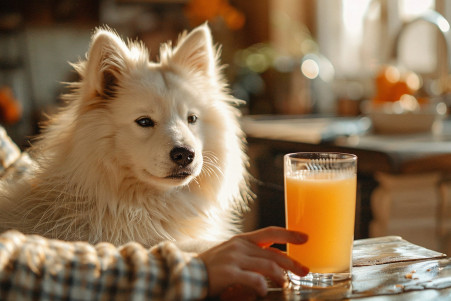Can Dogs Have Lemon Water? The Risks Explained
7 April 2024 • Updated 6 April 2024

The fresh, citrusy scent of lemons is often appealing to dogs, but is lemon water something you can give your pet, or are there risks associated with this popular beverage? Lemon water is not recommended for dogs because the citric acid in lemons can lead to stomach upset and other gastrointestinal problems. Even though small amounts may not be harmful, dogs should only drink regular, plain water to ensure they are properly hydrated. Lemons and lemon juice are also not good treats for dogs because they can cause irritation in the mouth and esophagus.
While the question of whether dogs can have lemon water is straightforward, it raises important questions about dog health and nutrition. In the sections below, we'll explore veterinary research and studies conducted by animal nutritionists to find out why citrus fruits like lemons are not good for dogs to consume on a regular basis. This investigation will shed light on the canine digestive system, food sensitivities, and the best ways to ensure dogs are getting the hydration they need to be healthy and well.
Can dogs drink lemon water?
What Are the Risks? Toxic Compounds in Lemons
Lemons contain a number of compounds that are toxic to dogs, including citric acid, psoralen, and limonene. Citric acid is an acid that can cause gastrointestinal upset, including vomiting, diarrhea, and stomach upset, when consumed in large quantities by dogs. Psoralen, which is found in lemon peels and rinds, can cause photosensitivity and skin irritation in dogs. Limonene, an essential oil that is found in lemons, can be toxic to a dog's liver and lead to liver damage.
Even small amounts of lemon juice or lemon-based products can be harmful to dogs, especially small dogs and puppies. According to Hepper, the psoralens and limonene in lemons are concentrated, which makes their toxicity more of a concern even in small amounts. Ingesting these compounds can cause dogs to vomit and have diarrhea to the point of dehydration, which can be life-threatening and require immediate veterinary attention. Because of the presence of these toxic compounds, lemons and lemon-based products should not be included in a dog's well-balanced diet.
Healthy Ways to Keep Dogs Hydrated
The only safe and healthy way to keep dogs hydrated is to give them fresh, clean water. Rover.com explains that water is important for dogs to maintain their body temperature, lubricate their joints, eliminate waste, help with digestion, and keep their skin healthy. Carbonated water, soda, and other drinks that contain sugar or caffeine can cause problems like bloat, low blood sugar, and caffeine toxicity according to Hill's Pet.
If dogs need extra hydration, vets may suggest giving them electrolyte-enhanced fluids or broths in small amounts. Dog owners should make sure their pets always have access to fresh water and encourage them to drink it regularly, especially in warm weather or after they've been exercising. PawSafe notes that while a little unsweetened sparkling water is probably OK, carbonated drinks should be avoided to prevent digestive problems like bloat.
Human Foods That Are Safe and Dangerous for Dogs
Since dogs are omnivores, they can eat many human foods in moderation, but there are also some that are unsafe due to toxicity or other health concerns. The American Kennel Club lists human foods that are safe for dogs as cooked, unseasoned chicken, turkey, beef, fish, eggs, and certain vegetables like pumpkin, green beans, carrots, and spinach, and fruits like apples and bananas.
Meanwhile, the ASPCA advises against feeding dogs chocolate, garlic, onions, grapes, raisins, macadamia nuts, and foods that are high in fat, salt, and sugar. Healthline also points out that beef, chicken, eggs, fish, and dairy products are common food allergens for dogs, so it's important to watch for any signs of an allergic reaction.
When it comes to feeding dogs human foods, it's important to prepare them properly, control portion sizes, and make sure they're part of a balanced diet. The American Kennel Club suggests that the best way to learn how to do this is to talk to a vet, who can provide personalized advice.
What Can Dogs Drink Instead of Lemon Water?
Instead of lemon water, there are plenty of safe and healthy alternatives that dogs can drink in moderation. WebMD recommends adding a few slices of fresh cucumber or watermelon to your dog's water bowl to give it a little flavor and make it more appealing. Unsweetened herbal teas, like chamomile or peppermint, can be diluted with water and served as a treat once they've cooled. Bulldogology also notes that bone broth or low-sodium chicken or beef broth can be mixed with water to give it a little extra flavor and nutrition.
Of course, pet owners should always check with their veterinarian before giving their dog any new drinks or foods, as Dogs Naturally Magazine points out that the citric acid in lemons can cause digestive issues and dental erosion in dogs. However, by offering a range of safe, dog-friendly drinks, pet owners can make sure their dogs stay hydrated and healthy without the risks that come with lemon water.
How to Treat Lemon Toxicity in Dogs
If a dog has eaten a large quantity of lemon or lemon juice, it may experience symptoms such as vomiting, diarrhea, skin irritation, and depression. PetMD explains that the acidity of lemons can cause gastrointestinal upset in dogs, which can result in these symptoms. In more serious cases, lemon toxicity can cause liver damage or an intestinal blockage, both of which require immediate medical treatment from a veterinarian.
The treatment for lemon toxicity will vary based on the amount of lemon the dog has ingested, the dog's size and overall health, and the severity of the dog's symptoms. Daily Paws notes that treatment options may include vomiting, activated charcoal to absorb the toxins, and IV fluids to prevent dehydration. It's important for dog owners to act quickly and contact their veterinarian if they suspect their dog has ingested a toxic amount of lemon or lemon-based products.
Because PetMD cautions that the consumption of lemon juice and peels in large quantities can be life-threatening for dogs, it's important for dog owners to be able to recognize the signs of lemon poisoning and to seek medical treatment as soon as possible. By being aware of the potential dangers and responding quickly, dog owners can help ensure their pets remain safe and healthy.
Conclusion: How to Keep Dogs Hydrated and Safe
Even if dogs are attracted to the smell of lemons, lemon water and other citrus-based drinks should be avoided due to the potential health risks. The American Kennel Club lists citric acid, psoralen, and limonene as some of the toxic compounds in lemons that can lead to digestive upset, skin irritation, and liver damage in dogs, even in small amounts.
In addition to the potential for digestive upset, the high acidity of lemon juice can lead to vomiting, diarrhea, and dehydration in dogs. As Hepper explains, the psoralens and limonene in lemons are concentrated, which makes their toxicity more dangerous even in lower doses.
The best and safest way to keep dogs hydrated and healthy is to give them fresh, clean water. Carbonated water, soda, and other sugary or caffeinated drinks can lead to problems like bloat, low blood sugar, and caffeine toxicity.
As with all new foods and liquids, including safe alternatives to lemon water, it’s important to use moderation and to consult a vet. By making sure to meet a dog’s nutritional needs and to watch out for potential toxins, dog owners can make sure their pets are well-hydrated and healthy.


